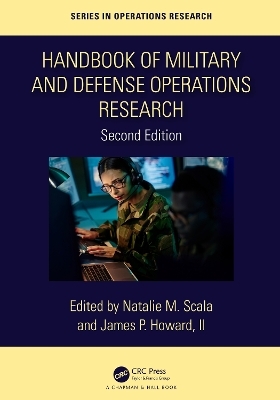
Handbook of Military and Defense Operations Research
Chapman & Hall/CRC (Verlag)
978-1-032-49748-8 (ISBN)
Tracing its roots back to World War II, operations research (OR) has become a vital tool in military and defense strategy. The second edition of the Handbook of Military and Defense Operations Research highlights this evolution, showcasing how OR integrates with cutting-edge areas like artificial intelligence, cybersecurity, and big data analytics.
This volume is more than a historical account; it is a practical guide. The volume features expert voices and offers insights into OR applications in modern security challenges. Readers will discover a blend of theory and real-world case studies, making it an essential resource for both newcomers and seasoned defense analysis professionals.
Dive into this handbook to explore the rich, dynamic field of military and defense operations research, a discipline at the heart of global security and strategic decision-making.
New to the second edition:
Reorganized into a three-part structure
Extensive revisions throughout
Numerous new exercises, examples, and case studies
Several new chapters
Natalie M. Scala is a professor in the College of Business and Economics and a fellow of the Center for Interdisciplinary and Innovative Cybersecurity at Towson University. She earned Ph.D. and M.S. degrees in industrial engineering from the University of Pittsburgh. Her primary research is in decision analysis, with specialization in military and security issues, including risk in voting systems, attack trees and strength of threat in mail voting, integrity of votes throughout the supply chain, poll worker education, and cybersecurity metrics and best practices. She co‑directs the Empowering Secure Elections research lab, which defines threats to voting as systemic and an interplay between cyber, physical, and insider sources. Her work in elections security earned a University System of Maryland Board of Regents Award for Excellence in Public Service, the system’s highest faculty honor. In conjunction with Anne Arundel County, Maryland, her work in cybersecurity and threat training for poll workers received a U.S. Elections Assistance Commission Clearinghouse Award for Outstanding Innovation in Election Cybersecurity and Technology. Dr. Scala frequently consults for government clients and has extensive professional experience, including positions with Innovative Decisions, Inc. / ITA International, the United States Department of Defense, and the RAND Corporation, as well as a faculty affiliation with the University of Maryland’s Applied Research Lab for Intelligence and Security. She is an associate editor for Military Operations Research and is a Past President of the Military and Security Society of INFORMS. James P. Howard, II is a multifaceted professional with extensive experience in data science, consulting, teaching, and community service. He has previously worked as a consultant to various United States government agencies, including the Securities and Exchange Commission, the Executive Office of the President, and the Department of Homeland Security. Additionally, he served as an internal consultant on scientific computing for the Board of Governors of the Federal Reserve System. Dr. Howard is also deeply committed to education, having taught mathematics and statistics at the University of Maryland Global Campus since 2010, as well as public affairs at other institutions. His career highlights include involvement in innovative projects such as modeling the spread of infectious diseases, predicting global events, researching blockchain applications in government, and designing rescue devices for building collapse scenarios. He has authored and co‑edited several books on these subjects.
Part I Approaches 1 Modern Data Analytics for the Military Operations Researcher; 2 Microsoft Excel: The Universal Tool of Analysis; 3 Multiattribute Decision Modeling in Defense Applications; 4 Military Workforce Planning and Modeling; 5 Military Assessments; 6 Threatcasting in a Military Setting; 7 Analytical Modeling of Stochastic Systems; 8 Modern Methods for Characterization of Social Networks through Network Models; 9 Process Optimization through an 8‑Step Structured Problem‑Solving Method; 10 Simulation Optimization; 11 Analytical Test Planning for Defense Acquisitions; 12 Influence Diagrams for Risk Management in Military and Defense; 13 Wavelet Methods for Time Series Forecasting; 14 Simulation Validation Literature Review; Part II Applications 15 A Model for and Inventory of Cybersecurity Values: Metrics and Best Practices; 16 Applying Information Theory to Validate Commanders’ Critical Information Requirements; 17 Modeling and Analysis of the Army’s Sustainable Readiness Model Scheduling Problem; 18 Applying High Performance Computing Analytics for Understanding Weather Impacts on Installations; Part III Soft Skills and Perspectives 19 Why Won’t They Use Our Model?; 20 Lessons Learned from Military Fast Jet Life Support System Test Planning
| Erscheinungsdatum | 09.07.2024 |
|---|---|
| Reihe/Serie | Chapman & Hall/CRC Series in Operations Research |
| Zusatzinfo | 66 Tables, black and white; 167 Line drawings, color; 2 Halftones, color; 169 Illustrations, color |
| Sprache | englisch |
| Maße | 178 x 254 mm |
| Gewicht | 453 g |
| Themenwelt | Informatik ► Theorie / Studium ► Künstliche Intelligenz / Robotik |
| Mathematik / Informatik ► Mathematik ► Angewandte Mathematik | |
| Sozialwissenschaften ► Politik / Verwaltung | |
| Technik ► Umwelttechnik / Biotechnologie | |
| ISBN-10 | 1-032-49748-3 / 1032497483 |
| ISBN-13 | 978-1-032-49748-8 / 9781032497488 |
| Zustand | Neuware |
| Haben Sie eine Frage zum Produkt? |
aus dem Bereich


